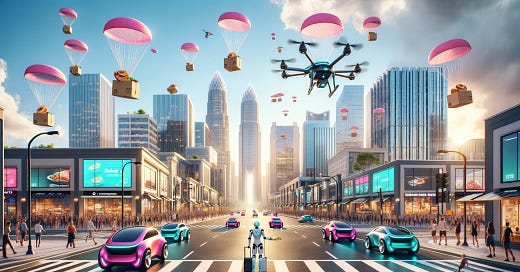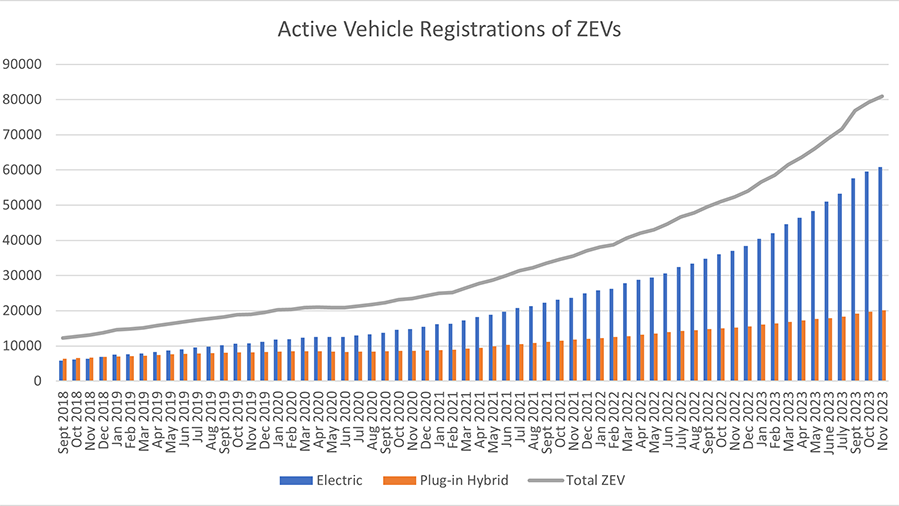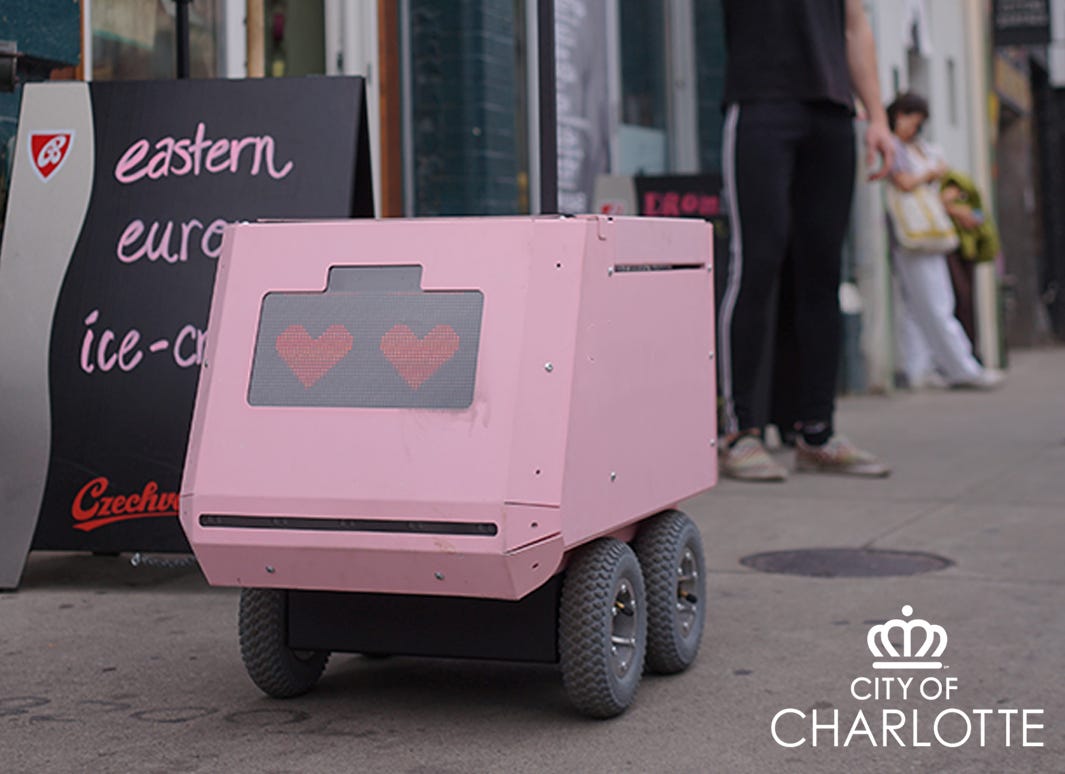It's a winding road to the future
Experiments with new technologies don't always yield immediate success.
You’re reading Transit Time, a weekly newsletter for Charlotte people who leave the house. Cars, buses, light rail, bikes, scooters … if you use it to get around the city, we write about it. Transit Time is produced in partnership between The Charlotte Ledger and WFAE.
We’ve been promised a future of self-driving cars, delivery drones and robots that bring us food. But we’re not there yet.
The Charlotte of the future? Sleek self-driving electric cars and efficient delivery drones might get here — someday. There have been recent setbacks. (Photo illustration using DALL-E/ChatGPT)
by Ely Portillo
WFAE
Where the heck is the future, anyway?
If you’ve been following transit and transportation for a few years in Charlotte, you might be forgiven for a reflexive twinge of skepticism when it comes to grand pronouncements about the future. Big ideas seem to be ever-slipping out of sight over the horizon.
What was once the city’s 2030 transit plan is now more like the 2045 transit plan — if Charlotte can rally enough support, win approval from the northern towns, get permission from Norfolk Southern to run the Red Line on its tracks, plus sway voters and the General Assembly to approve a one-cent sales tax hike. Somehow, the list of things that have to happen before the Charlotte Area Transit System even starts construction is getting longer, not shorter.
But while the stalled transit plan is the most visible encapsulation of our current transportation stasis, it’s far from the only one. A lot of buzzy new programs and technologies in Charlotte have fizzled. (Remember Geoffrey, the pink food delivery robot? Yeah, we barely did, either.) Or they just simply aren’t as far along as more optimistic forecasts expected.
Take electric vehicles. The number of EV registrations has been rising steadily in North Carolina, topping 81,000, data from the N.C. Department of Transportation shows. That’s a big increase from just five years ago, when the number of EVs in the state was just about 11,000.
The number of electric and plug-in vehicles in North Carolina is growing rapidly, to more than 81,000 as of late 2023. But the number of gas-powered vehicles is growing fast, too. (Source: NCDOT.)
It’s a similar story in Mecklenburg County. State data shows about 15,000 EVs in Mecklenburg as of late 2023, counting plug-in hybrids and full EVs. That’s a huge increase from five years ago, when there were just under 2,000 registered EVs. Both are close to an eight-fold increase.
But consider the other side of that equation. The number of gasoline- and diesel-powered vehicles in Mecklenburg rose by even more: 57,000 during that same time, to 769,000. Yes, the number of EVs is growing at a much faster rate — an encouraging sign if you think we need to move to lower-carbon transportation — but there’s still a long, long way to go before the electric future arrives.
Back to those robots. Yes, Geoffrey, RIP. I counted 54 local Google News results when Geoffrey — actually a delivery robot owned and operated by Tiny Mile — started delivering food from restaurants in uptown and Plaza Midwood in 2022. They were a fun novelty, even though they weren’t actually autonomous (a remote driver steered each robot, using cameras). I remember pausing to let one of the Geoffrey robots cross Central Avenue and feeling like I was living in “The Jetsons.”
Geoffrey, we hardly knew ye: The pink food-delivery robots from Tiny Mile have pulled out of Charlotte after being tested here since 2022. (Photo courtesy of the city of Charlotte)
But as of late last year, Geoffrey had pulled out of Charlotte. WSOC-TV reported that Tiny Mile now operates in just Miami, which the company’s website appears to confirm. The company didn’t return a message seeking more information about whether it plans to return to Charlotte.
So, for now, we’re down to just one robot food delivery service in Charlotte: Starship, which delivers Bojangles and other fast food on UNC Charlotte’s campus. You could argue that having even one robot food-delivery service is kind of futuristic, but the option of getting BoBerry Biscuits on a single college campus seems to fall well short of a truly inspiring vision of the future.
What about Cruise, the self-driving cars that also made a big splash last year when they were spotted driving Charlotte streets? Well, after a brief foray to explore the city (with human drivers behind the wheel), Cruise quickly disappeared.
Asked if the company has any plans to return to Charlotte — maybe even with its much-touted self-driving taxis — a spokesperson replied, “No further updates to share at this time, but we appreciate you checking in.”
It’s been less than two years since the company’s former CEO tweeted: “Folks, we are entering the golden years of AV expansion.” At the time, Cruise was operating driverless cars in Phoenix, Austin and San Francisco, with plans to expand quickly. But after a series of crashes and other toxic PR disasters (a report that the cars struggle to detect children didn’t help), the GM-owned company laid off a quarter of its staff, recalled all its cars and went back to the drawing board to overhaul its robotaxis prior to a relaunch.
Cruise isn’t the only driverless car company facing scrutiny. Tesla recalled almost all of its cars over its self-driving features, which have been linked in media reports to a dozen deaths. Self-driving cars, always prophesied to be a few years away, are still at least a few years away.
Finally, drone delivery: Zipline, an autonomous drone company, got plenty of press when it started delivering PPE, medical supplies and medicines in the Charlotte region during the Covid pandemic.
Since then, Zipline has expanded and now boasts that it’s closing in on 1 million deliveries on four continents. The company is rolling out its second-generation delivery vehicle, which it says will be easier to load, launch and recover. Plus, instead of dropping deliveries by parachute into a zone the size of at least two parking spaces, the second-generation drone can place them neatly on the recipient’s doorstep.
Zipline announced last month that it is partnering with Walmart to expand drone delivery to 1.8 million households in the Dallas-Fort Worth area. Combined with recently granted authority from the FAA to fly more places completely autonomously, with no visual oversight, Zipline is set to conduct one of the largest and most ambitious tests ever of whether drone delivery is a real, commercially viable technology that can become as ubiquitous as smartphones or Uber.
But as for Charlotte? A company representative said Zipline isn’t currently conducting any deliveries in our area.
So how should we feel about the mirage-like, futuristic promises? Should we be disappointed that we don’t yet have self-driving, electric vehicles whisking us around and drones dropping pizza straight into our mouths?
Well, maybe not. After all, if you go back just 20 years, a lot of the transportation technology we’ve got now — summoning drivers to your exact GPS coordinates through your smartphone, for example — would look pretty futuristic. Plus, there is that Domino’s app that tracks your pizza in real-time, from dough to doorstep … and maybe that’s good enough.
Ely Portillo is senior editor for news and planning at WFAE, Charlotte’s NPR news source. He was previously with the UNC Charlotte Urban Institute and spent a decade as a reporter at The Charlotte Observer. Reach him at eportillo@wfae.org
Related Transit Time article:
“Charlotte’s robot and drone experiments are multiplying” (April 28, 2022)
In brief
New CATS bus operator takes over: Charlotte Area Transit System interim CEO Brent Cagle said Monday that the new contractor operating Charlotte’s bus system, National Express Transit, will start “later on this week/next week.” It takes over from longtime operator RATP Dev. Cagle said National Express’ leadership team will be introduced to Charlotte City Council members and to members of the Metropolitan Transit Commission.
Outside CATS reviews almost finished: The Federal Transit Administration is almost finished with a series of reviews of the operations and finances of the Charlotte Area Transit System, interim CEO Brent Cagle said this week. The city ordered the reviews after the discovery last year of a 2022 light rail train derailment and accompanying staffing and inspection issues.
Transit Time is a production of The Charlotte Ledger and WFAE. You can adjust your newsletter preferences on the ‘My Account’ page.
Did somebody forward you this newsletter and you need to sign up? You can do that here:
Other affiliated Charlotte newsletters and podcasts that might interest you:
The Charlotte Ledger Business Newsletter, Ways of Life newsletter (obituaries) and Fútbol Friday (Charlotte FC), available from The Charlotte Ledger.
The Inside Politics newsletter, available from WFAE.








